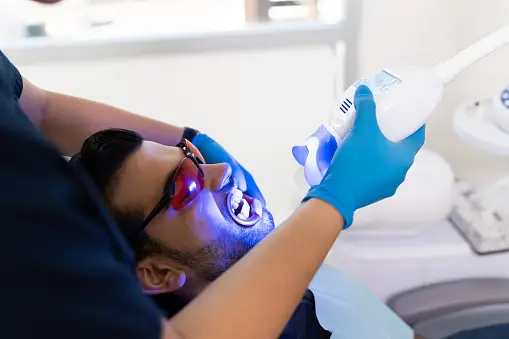The Ultimate Guide to Laser Teeth Whitening: What You Need to Know

Although tooth discoloration is a typical issue, laser teeth whitening is a well-liked and efficient remedy. Teeth that have discolored over time can be significantly whitened using a laser. During the procedure, which takes place in a dental chair, a dentist uses a laser-activated whitening solution to apply to your teeth. It’s a rapid and efficient therapy that typically only requires one visit.
Are teeth whitening using a laser safe?
Laser teeth whitening is a fairly safe procedure because it is non-invasive and doesn’t require surgery. Teeth whitening with lasers performed by a dentist won’t harm your teeth.
If your gums or other soft tissues in your mouth come into touch with the bleaching chemicals in your take-home whitening kit, there is a very slim chance that you could get chemical burns. All you need to do is use caution when applying makeup at home.
The only exceptions are new moms and expectant mothers, as the bleaching chemicals carry a danger of affecting the fetus and getting into the breast milk. It is advisable to postpone teeth whitening until after you have finished breastfeeding.
Teeth Whitening with a laser Effects
When a dentist uses laser teeth whitening, there are extremely few adverse effects. During the whitening procedure, the teeth may get dry, which may cause sensitivity. A few days following treatment, some patients experience increased sensitivity in their teeth and gums; however, this normally goes away 12 to 36 hours later. See your dentist if you’re experiencing any issues.
Teeth Whitening Time-period
A tooth’s color can usually be improved by several shades using laser teeth whitening. But keep in mind that not everyone will experience the same level of tooth whitening. Teeth that are discolored or stained won’t whiten as much as whiter teeth. Teeth with gray tones will not whiten as well as teeth with yellow tones.
Preparation for Teeth Whitening
It is advisable to have a thorough examination of your teeth before beginning any whitening procedures. When teeth are actively decaying, using whitening solutions might exacerbate the pain or break the tooth. Certain soft tissue conditions may become worse due to the bleaching agents. It is preferable to recognize and address these issues before starting therapy. For this process, you can search for a dental clinic near me.
Teeth Whitening Process for Everyone
Not everyone is a good candidate for laser tooth whitening. Not suited for those who have:
- A significant amount of gum disease or active decay
- neglected dental issues
- heightened sensitivity of teeth
- exposed surfaces of the roots
For whom is teeth whitening appropriate?
The following individuals may benefit from teeth whitening:
- possess discolored or stained teeth
- Are you older than 16?
- Are old enough to comprehend the process
- Have reasonable expectations
- Will provide the appropriate aftercare
Teeth Whitening Process
The following is the process for getting a laser teeth-whitening treatment:
- To find out if laser teeth whitening is a good choice for you, speak with a dentist.
- Before teeth whitening, any dental issues, such as cavities and tooth rot, must be corrected following a dentist visit.
- To enable you to compare the outcomes, your dentist will take pictures of your teeth.
- Your teeth will receive a thorough cleaning and polish from your dentist.
- Your dentist will apply a material that covers and protects the gums to start the whitening process.
- Next, the teeth are treated with the whitening solution.
- Three applications of eight minutes each will be made to activate the whitening agent using a Laserbrite light.
- To keep your teeth looking their best over time, your dentist will provide you with take-home whitening gel and custom trays.
Maintenance of Laser Teeth Whitening
Drinking colored beverages, such as tea, coffee, soft drinks, or sports drinks, for at least 48 hours following a whitening procedure will not provide the greatest effects. Eat nothing too hot or cold, and refrain from smoking during the first few days after therapy.
How frequently should I get my teeth whitened with a laser?
The color of teeth whitened with a laser treatment inevitably fades, thus the effects are temporary. For as long as two years, laser tooth whitening can yield excellent results, depending on the individual. Your eating habits, lifestyle, and the initial causes of your tooth discoloration will all affect how long your teeth remain white.
Once your color starts to fade, professional teeth whitening using lasers from a dentist is advised for optimal results. In between treatments, you can utilize the customized trays you were provided to top up your whitening once a month. This will support color retention.
Duration of Teeth-whitening Process
To delay the onset of teeth discoloration, consider the following tactics to delay laser teeth whitening procedures:
- To keep your grin from turning yellow and dirty, stop smoking or reduce back.
- As far as possible, steer clear of staining foods and beverages (including blueberries, beetroot, coffee, and red wine).
- Try drinking through a straw and then rinse your mouth with water if you must eat or drink anything that stains. Additionally, if you can, consider brushing your teeth after.
- Use whitening toothpaste to help get rid of surface stains and maintain the whiter appearance of your teeth for longer.
- Continue your regular dental hygiene routine. It’s imperative to brush and floss at least twice a day.
- Approximately every six months, have your teeth professionally cleaned to avoid the development of tough stains.
Conclusion
Crowns and veneers are examples of dental restorations that are color-matched to your natural teeth. Whitening teeth is only effective on tooth enamel. Veneers, fillings, bridges, and crowns will all remain the same color after this. As a result, they might not look like teeth that have been whitened. If they no longer match the rest of your whitened teeth, you might need to replace them.









